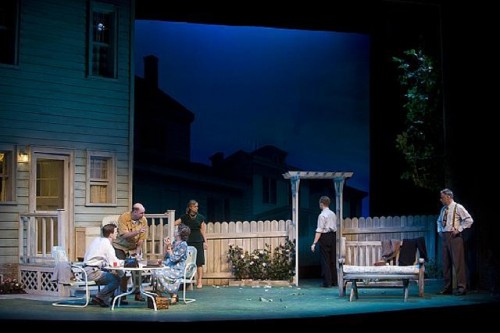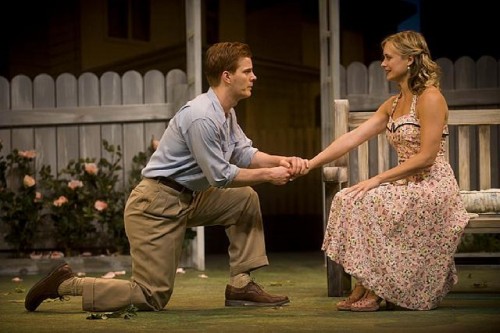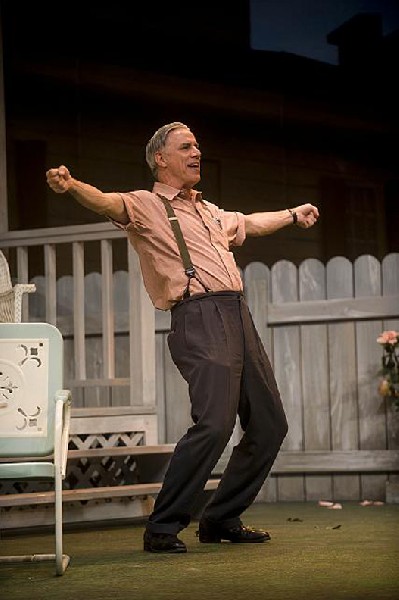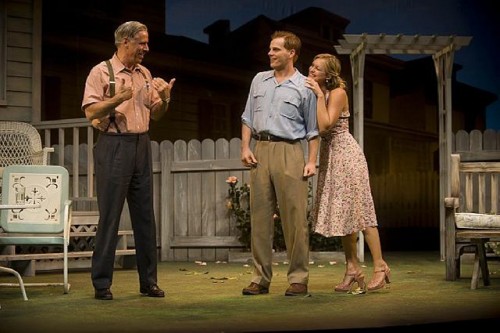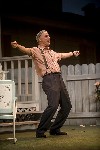All My Sons at Barrington Stage
Old Men Send Young Men to War for Profit
By: Charles Giuliano - Jul 23, 2012
All My Sons
By Arthur Miller
Directed by Julianne Boyd
Scenic Design, David M. Barber; Costume Design, Jennifer Moeller; Lighting Design, Scott Pinkney; Sound Design, Will Pickens.
Cast: Jeff McCarthy (Joe Keller), Lizbeth Mackay (Kate Keller), Rebecca Brooksher (Ann Deever), Matthew Carlson (George Deever), Josh Clayton (Chris Keller), Andrew Gillman (Bert), Emily Kunkel (Lyrid Lubey), Andy Nogasky (Frank Lubey), Peter Reardon (Dr. Jim Bayliss) and Pilar Witherspoon (Sue Bayliss).
The Boyd-Quinson Main Stage,
Union Street, Pittsfield
July 19-August 4,2012.
About Two hours fifteen minutes plus one 15 minute intermission.
Barrington Stage Company
Box Office 413-236-8888.
Arthur Miller (1915-2005) was 32 when his 10th play All My Sons was produced on Broadway. A prior one had closed after a few performances. If it proved to be a failure he vowed to seek another line of work.
The play opened at the Coronet Theatre on January 29, 1947 and closed on November 8, 1947. It ran for 328 performances. It was directed by Elia Kazan (to whom it is dedicated) and won the New York Drama Critics' Circle Award, beating Eugene O’Neill’s The Iceman Cometh. It starred Ed Begley, Beth Miller, Arthur Kennedy, and Karl Malden. It won both the Tony Award for Best Author and the Tony Award for Best Direction of a Play.
In 1949, Miller wrote Death of a Salesman to which All My Sons is often compared. In line with leftist views which he shared with Kazan, Miller focused on the bleak and depleted aspects of The American Dream. It earned him a subpoena to appear before the House Committee on Un-American Activities. On a similar occasion Kazan named associates he had known as fellow members of the Communist Party which he by then denounced.
Many exposed by Kazan were black listed from working on Broadway or in Hollywood. Miller reflected the opinions of many by shunning Kazan as a traitor. The Crucible, 1953, drew parallels between the Salem Witch Trials and the Red Scare led by Senator Joseph McCarthy.
In All My Sons Miller explored the theme of profiteering during wartime. Young men fight and die for their country while fat cat industrialists, in this case, Joe Keller the owner of a small factory that supplied cylinder heads for P-40s plane, grow rich in military contracts.
Miller’s iconic play, on the short list of his greatest works, is currently being accorded a riveting production, meticulously directed by Julianne Boyd, the artistic director of Barrington Stage in Pittsfield, co-starring Jeff McCarthy as Joe Keller and Lizbeth Mackay as his wife Kate. It continues on the Boyd-Quinson Main Stage through August 4.
The play was inspired by a similar true story of a man turned over to authorities by his daughter.
While embedded in the social and political aftermath of World War II, and a focus on the impact on former partners and their families, Miller skillfully crafted the drama based on the paradigms of classical Greek tragedy.
The protagonist, Joe, has committed a crime, which continues to haunt him. His partner Steve Deever, who never appears on stage, called to tell him that a batch, more than a hundred cylinder heads, were cracked during production. He remained home with an alleged flu and instructed his partner to spot weld and ship the faulty cylinders. Their use resulted in the crash of 21 planes.
During a later trial Joe denied involvement in shipping the cylinders. Deever took the fall and during the 24 hour time frame of the play is nearing release. It is one of Aristotle’s rules that the action of a tragedy be completed within a single day. His daughter, Ann (Rebecca Brooksher), who was “the girl” of the Keller’s missing son Larry, has been invited, three years later, to visit by Chris Keller (Josh Clayton). They have been corresponding romantically and plan to marry.
Chris has survived the war although he lost all of the men under his command. Ann’s brother George (Matthew Carlson) also fought. Miller, who was 25 when war broke out, did not serve in the military. Joe and his partner ran the factory as their part in the war effort.
A plot point is a lack of proof that the missing Larry is indeed dead. Kate clings to hope that her son survives. As she reads in newspapers, like others missing in action, he may yet come home. Because Ann is “Larry’s girl” she opposes an engagement to Chris.
A neighbor Frank Luby (Andy Nagasky) has been working on a horoscope for Larry. If the day he went missing proves to be a “lucky day” the odds are a million to one that he would die.
The Barrington production is superbly designed with a set by David M. Barber. The action transpires in the back yard of a middle class neighborhood. Although Joe has become wealthy, through the blood money of war profits, they continue to live modestly. His one hope and dream, particularly under a crushing burden of guilt and shame, is to pass on the business and wealth to his surviving son.
Who then are the All My Sons of the title? That is revealed in the explosive conclusion of the play. As in a Greek tragedy the Gods demand retribution so that the other characters may be absolved of the crime and pursue their shattered lives.
During the wrenching denouement, facing the accusations of Ann’s brother George , stripped bare of his deceptions and greed, Joe vainly argues that he did it for his family and to pass on the business. Flailing about Joe states that he is no better or worse than other war mongers and profiteers. No tank rolls out of a factory without someone getting paid for it. In that sense, Joe argues, at least half of America is as guilty as he is. If Larry died in a plane crash, as Kate states scathingly, then the father, her husband, has killed his son. Not just his own, but those 21 others. All My Sons.
It is Miller’s subversive, devastating, agit-prop, Greek, indictment. He totally dismantles the notion of morality and war as seen through the lens of an American family. In the context of the Cold War it may indeed have been a subversive message. Arguably, today the play evokes a more abstracted theatrical response than in 1947, when many in the audience were struggling with the loss of loved ones.
In Germany the major Nazi corporations, Krupp and Mercedes, that built the planes, tanks and artillery, or Bayer, gas for the death chambers, continue to prosper.
Joe Keller was just a small cog in the wheel of the American War Machine.
Of course the brilliance of Miller is that most audiences don’t view this work that way. They are willing to experience it as a well crafted drama.
By contrast, when Boyd presented The Crucible, a couple of years ago, it was the focus of a broad educational mandate. It was a part of the school curriculum and there were arrangements to invite students for special presentations.
It begs the question of what we learn from this stunning production of All My Sons? One starts with the notion of great theatre. This is a superb cast which, under Boyd, explores all of the explosive nuances of a canonical work of art.
Other than those stunning performances you wonder what the audience took with them as they left the theater? The aftermath of World War II seems so long ago. A direct connection has subsided since 1947 when the impact on audiences was likely to be more visceral.
Great art endures to remind us that there is never a war to end all wars. Old men continue to send young men to fight and die. For patriotism or greed? That’s the conundrum I took home from Miller’s play.

